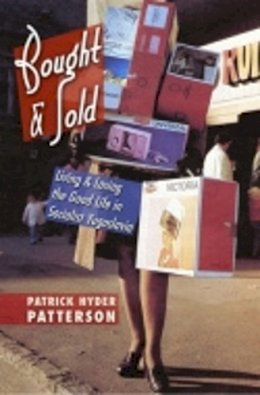
Bought and Sold: Living and Losing the Good Life in Socialist Yugoslavia
Patrick Hyder Patterson
Yugoslavia was unique among the communist countries of the Cold War era in its openness to mixing cultural elements from both socialism and capitalism. Unlike their counterparts in the nations of the Soviet Bloc, ordinary Yugoslavs enjoyed access to a wide range of consumer goods and services, from clothes and appliances to travel agencies and discotheques. From the mid-1950s onward the political climate in Yugoslavia permitted, and later at times encouraged, a consumerist lifestyle of shopping, spending, acquiring, and enjoying that engaged the public on a day-to-day basis through modern advertising and sales techniques. In Bought and Sold, Patrick Hyder Patterson reveals the extent to which socialist Yugoslavia embraced a consumer culture usually associated with capitalism and explores the role of consumerism in the federation's collapse into civil war in 1991.
Based on extraordinary research and featuring remarkable examples of Yugoslav print advertising and mass culture, this book reconstructs in often dramatic detail the rise of a culture in which shoppers' desires trumped genuine human needs. Yugoslavia, Patterson argues, became a land where the symbolic, cultural value of consumer goods was a primary factor in individual and group identity. He shows how a new, aggressive business establishment promoted consumerist tendencies that ordinary citizens eagerly adopted, while the Communist leadership alternately encouraged and constrained the consumer orientation.
Abundance translated into civic contentment and seemed to prove that the regime could provide goods and services equal to those of the capitalist West, but many Yugoslavs, both inside and outside the circles of official power, worried about the contradiction between the population's embrace of consumption and the dictates of Marxist ideology. The result was a heated public debate over creeping consumerist values, with the new way of life finding fierce critics and, surprisingly for a communist country, many passionate and vocal defenders. Patterson argues that consumerism was one of the critical factors that held the multiethnic society together during the years of the Yugoslav "Good Life" of the 1960s and 1970s. With the economic downturn of the 1980s, however, the reliance on expanding consumerism ultimately led to bitter disillusionment, stripping the unique Yugoslav model of its legitimacy and priming the populace for mutual resentment, ethnic conflict, and war.
Product Details
About Patrick Hyder Patterson
Reviews for Bought and Sold: Living and Losing the Good Life in Socialist Yugoslavia
Gordana P. Crnkovic
Slavic and East European Journal
In this sophisticated yet readable analysis, Patterson argues that a culture of consumption was utterly central to the socialist experiment in Yugoslavia.... In a nation whose peoples held varied ethnic and religious identities, these consumer-driven aspirations constituted an integral element of cohesion in a society vulnerable to disaggregation.... Having addressed how consumer culture was crucial to the success of the Yugoslav sociopolitical experiment, Patterson ultimately demonstrates the centrality of consumer culture to that state in another way: its demise, when declining economic prospects convinced many Yugoslavs that their 'dream' was no longer attainable. Summing Up: Highly recommended.
Choice
Patterson captures the scale and shape of the buying, the power of advertising, and the effect of Yugoslav guest workers returning from capitalist consumer societies. He also chronicles the misgivings about consumer culture felt in some parts of society and their efforts to tame and then fight the values that came with the goods. Nonetheless, consuming held the country together. When the economic crisis hit in the 1980s, the good life dissipated, and Patterson maintains that the loss of that source of legitimacy did as much to sunder the country as the rise of ethnonationalism.
Robert Legvold
Foreign Affairs
